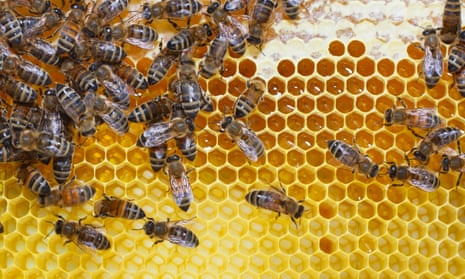‘I was facing the bees, but I also ended up facing myself in that relationship, and once you begin facing stuff maybe things begin opening up.” The writer Helen Jukes trails off, shrugs apologetically. “I’m being really inarticulate about this and I’m not sure why.” She’s happy enough to talk about the bees she kept in her back garden, to explore the changing symbolism of the hive throughout the ages. But when the conversation shifts to the relationship whose first steps she charts in her memoir, she’s not sure what to say. “I’m a bit wary about it being billed as a love story. It’s true, all of this stuff did happen, but I haven’t quite found the right words to describe it.”
The story of this burgeoning relationship is only one strand of her captivating debut, A Honeybee Heart Has Five Openings. In it, Jukes charts how a year spent looking after a beehive helped her throw off the deadening grind of her working life and reconnect with friendship and the natural world. As the bees buzzed back and forth, her growing fascination with the changing rituals of the insects living in her garden offered new perspectives both on her job and everything outside the office walls. What she saw when she lifted off the lid of the hive was so alien that by looking at them intently she became steadily more attuned to her own humanity.
Jukes says she’s always been “quite a nature bod”. She grew up in Ullesthorpe, a village in the Leicestershire flatlands, and spent a lot of time outside. After studying psychology, in 2006 she began an MA in postcolonial studies at Goldsmiths, London. There in the city, she met an urban beekeeper and started helping with his hives. “Although I was living quite an office-y life a lot of the time, there was always this escape valve where I could spend a couple of hours opening hives.”
So in 2014, when she found herself ground down by deadlines and boxed in by the office cubicle at the homeless charity where she was working, it was only natural that Jukes should think of getting bees of her own.
“There’s something really particular about opening a hive,” Jukes says, her eyes lighting up. Examine them closely, she explains, and you realise bees are forever caught between two competing modes of being. Just as in quantum mechanics, where you can think of light as either a wave or a particle, but never entirely one or the other, “you can think of a colony either as individuals or as a collective. The whole of beekeeping history seems to be this repetition of confusion. Each time people try to fit them into categories, they seem able to escape them. Are they individuals or a collective? Is honey animal-based or plant-based? Are bees wild or domestic?”

Writers such as William Morton Wheeler and Jürgen Tautz have considered colonies as one superorganism, but many studies have revealed bees are surprisingly individual. “They’ve been shown to have different personalities. It’s terrible anthropomorphism, but you get ‘lazy’ foragers or ‘sleepy’ foragers – genuinely different characteristics. And so I can’t believe that a colony is this big, anonymous mass.”
This polyvalent status is reflected in the fact that Jukes didn’t name her colony, preferring to call them only “the bees”. She hesitates to ascribe the collective an intelligence, “because it feels lower down than something cerebral. It feels like an energy, or a logic, maybe a system or a process.” The insects buzzing in a heavy wooden box or thronging at the entrance to the hive are “a thing rather than an intelligence”. There’s a wild potential in a collection of bees, Jukes continues, that makes the suggestion of ownership in the term “beekeeper” seem subtly wrong. “I can keep a hive and I can make a space where they can live, but ‘keeping’ them would be impossible.”
The bees’ existence is very different to our own, she says, but it’s a mistake to think the natural world is beyond human experience. “Becoming a beekeeper and becoming involved in a colony, I didn’t find something that was separate from the human world, I found an ecology that was massively implicated by me and the people around me and the environment around us.”
This newfound intimacy with nature allowed her to unlock her personal life as well. “I hadn’t opened into a relationship for a long time,” she says. “I wasn’t really sure why, but it’s difficult to go from that place of being really stuck into opening up, and maybe that year was one way of it happening.”
While the relationship she began in Oxford is going from strength to strength, the colony that flourishes in Jukes’s memoir has since reached a tragic ending, succumbing to the varroa mite after she moved out to live in the Wye valley.
“There’s this really old folk tale called Telling the Bees,” she says, “which describes how you must tell the bees about any big changes happening in the house, or they might die. And I told them I was going, and we tried everything; but I think it was the varroa.”
With the number of pollinating insects in the UK declining by 13% between 1980 and 2014, and some studies finding the population of flying insects has decreased by as much as 76% over the last 25 years, the prospects for bees all over the world are looking grim. But Jukes takes heart from campaigners working towards the kind of step change required. “I hope it’s not too late,” she says. “I think we have to believe individuals can make a difference, because otherwise what’s the point?”

Comments (…)
Sign in or create your Guardian account to join the discussion